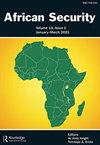Beyond Ungoverned Spaces: Connecting the Dots between Relative Deprivation, Banditry, and Violence in Nigeria
IF 1.3
Q2 POLITICAL SCIENCE
引用次数: 8
Abstract
ABSTRACT The emergence of criminal groups—“armed bandits” in the local parlance—in the northwest geopolitical zone has compounded the security conundrums in Nigeria. The dominant explanation for the ongoing banditry draws on the “ungoverned spaces” theoretical framework to contend that the phenomenon is a by-product of the state’s abject failure to monopolize violence over its territory. The failure on the part of the state to impose order on its territory leaves much room for loosely organized vicious armed groups to wreak havoc on local communities in the northwest region. The proponents of this perspective inevitably recommend a military solution to the security problem. In this article, I take a different position that counteracts the “ungoverned spaces” thesis. I argue that the “ungoverned spaces” thesis blatantly ignores the socioeconomic context within which banditry is embedded and how such context nurtures crime and deviance. Drawing on the relative deprivation theory, I contend that banditry owes not so much to “ungoverned spaces” but to the ethnic cum material grievances of some pastoralists who have taken to criminality for survival and who pinpoint discrepancies between what they had, what they have, and what they think they should have. I argue that resolving banditry would require attending to pastoralists’ grievances through apposite socioeconomic interventions.超越无治理空间:连接尼日利亚相对剥夺、盗匪和暴力之间的点
在尼日利亚西北地缘政治地区,犯罪集团(当地称为“武装土匪”)的出现,加剧了尼日利亚的安全难题。对持续的盗匪行为的主要解释是利用“无人管辖的空间”理论框架,认为这种现象是国家在其领土上垄断暴力的悲惨失败的副产品。国家方面未能在其领土上维持秩序,这给组织松散的邪恶武装团体留下了很大的空间,使他们能够在西北地区对当地社区造成严重破坏。这种观点的支持者不可避免地建议用军事手段解决安全问题。在本文中,我将采取不同的立场来反驳“未治理空间”的论点。我认为,“不受管制的空间”理论公然忽视了土匪所处的社会经济背景,以及这种背景如何滋生犯罪和越轨行为。根据相对剥夺理论,我认为盗匪与其说是由于“无人管辖的空间”,不如说是由于一些牧民的种族和物质上的不满,他们为了生存而从事犯罪活动,并指出他们所拥有的、他们所拥有的和他们认为他们应该拥有的之间的差异。我认为,解决土匪问题需要通过适当的社会经济干预来解决牧民的不满。
本文章由计算机程序翻译,如有差异,请以英文原文为准。
求助全文
约1分钟内获得全文
求助全文

 求助内容:
求助内容: 应助结果提醒方式:
应助结果提醒方式:


